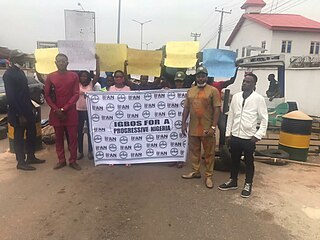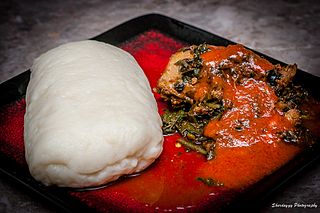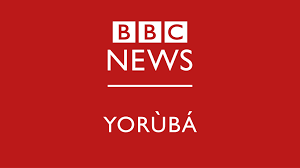
Ẹ̀bà (Yoruba) also known as Ebe or Pinon' is a staple swallow from Togo and Benin, also eaten in the West African sub-region and other African countries. The term èbà originates from Yoruba. It is a cooked starchy vegetable food made from dried grated cassava (manioc) flour commonly known as garri all across West Africa. It is often eaten with rich soups and stews, with beef, stockfish or mutton. The dish is often described as having a slightly sour, sharp taste.
Nigerian Pidgin, also known as Naija or Naijá in scholarship, is an English-based creole language spoken as a lingua franca across Nigeria. The language is sometimes referred to as Pijin, Brokun 'Ullu' or "Vernacular". It can be spoken as a pidgin, a creole, dialect or a decreolised acrolect by different speakers, who may switch between these forms depending on the social setting. In the 2010s, a common orthography was developed for Pidgin which has been gaining significant popularity in giving the language a harmonized writing system.

The culture of Nigeria is shaped by Nigeria's multiple ethnic groups. The country has 527 languages, seven of which are extinct. Nigeria also has over 1150 dialects and ethnic groups. The three largest ethnic groups are the Hausas that are predominantly in the north, the Yorubas who predominate in the southwest, and the Igbos in the southeast. There are many other ethnic groups with sizeable populations across the different parts of the country. The Kanuri people are located in the northeast part of Nigeria, the Tiv people of north central and the Efik-Ibibio are in the south South. The Bini people are most frequent in the region between Yorubaland and Igboland.

Egusi (Yoruba) is the name for the protein-rich seeds of certain cucurbitaceous plants, which, after being dried and ground, are used as a major ingredient in West African cuisine.

In West Africa, garri is the flour of the fresh starchy cassava root.

Àmàlà is a staple swallow food originating from Nigeria popularized by the Yoruba ethnic group of Southwestern Nigeria and other parts of Yorubaland. It is made of yam, cassava flour, or unripe plantain flour. Tubers of yams are peeled, sliced, cleaned, dried and then ground into flour. It is also called èlùbọ́. Yams are white in colour but turn brown when dried which gives àmàlà its colour. It is a popular side dish served with ewédú and gbẹ̀gìrì, but is also served with a variety of other ọbè(soups), such as ẹ̀fọ́, ilá, and ogbono.

Yoruba literature is the spoken and written literature of the Yoruba people, one of the largest ethno-linguistic groups in Nigeria and the rest of Africa. The Yoruba language is spoken in Nigeria, Benin, and Togo, as well as in dispersed Yoruba communities throughout the world.
Articles related to Nigeria include:

There are over 525 native languages spoken in Nigeria. The official language and most widely spoken lingua franca is English, which was the language of Colonial Nigeria. Nigerian Pidgin – an English-based creole – is spoken by over 60 million people.

Nigerian cuisine consists of dishes or food items from the hundreds of Native African ethnic groups that comprises Nigeria. Like other West African cuisines, it uses spices and herbs with palm oil or groundnut oil to create deeply flavored sauces and soups.

Anti-Igbo sentiment encompasses a range of negative attitudes and feelings towards the Igbo people. The Igbo people make up all of south-eastern Nigeria and a part of South-South and Middle Belt Nigeria's geopolitical zones. Igbophobia is observable in critical and hostile behaviour such as political and religious discrimination and violence towards the Igbo.
Several braille alphabets are used in Nigeria. For English, Unified English Braille has been adopted. Three other languages have been written in braille: Hausa, Igbo, and Yoruba. All three alphabets are based on English readings, with the addition of letter's particular to these languages. Punctuation is as in English Braille.
Tuwon masara is a Nigerian corn flour swallow eaten primarily by the Hausa and Fulani that resembles fufu. It has several alternative names. This meal is not only common in the northern parts of Nigeria, it is well known around the world, it is just cooked in different ways depending on the country.

Nollywood, a portmanteau of Nigeria and Hollywood, is a sobriquet that originally referred to the Nigerian film industry. The origin of the term dates back to the early 2000s, traced to an article in The New York Times. Due to the history of evolving meanings and contexts, there is no clear or agreed-upon definition for the term, which has made it a subject of several controversies.
Guosa is a constructed interlanguage originally created by Alex Igbineweka in 1965. It was designed to be a combination of the indigenous languages of Nigeria and to serve as a lingua franca to West Africa.

Pounded yam or Iyán (Yoruba) or Ruam-Yo (Tiv) is a Nigerian swallow food native to the Yoruba, Igbo Edo, Tiv and Ebira ethnic groups. It is a traditional food prepared by pounding boiled yam with a mortar and pestle. Pounded yam is similar to mashed potatoes but heavier in consistency. It is a smooth and tasty delicacy traditionally eaten with the hands.

BBC Yoruba is the Yoruba language service of the BBC World Service meant primarily for the Yoruba-speaking communities in Nigeria, Benin Republic, Togo and Yoruba speakers in diaspora. It is part of the 12 new language services incorporated by the BBC World Service. The other languages are Afaan Oromo, Amharic, Gujarati, Igbo, Korean, Marathi, Pidgin, Punjabi, Telugu and Tigrinya.

BBC Igbo is the Igbo language service of BBC World Service meant primarily for the Igbo-speaking communities in the south-east, South-south of Nigeria and Igbo people in diaspora. It is part of the 12 new language services added to the BBC services and the other languages are Afaan Oromo, Amharic, Gujarati, Yoruba, Korean, Marathi, Pidgin, Punjabi, Telugu and Tigrinya.
Wazobia is a term that means "come" in three major Nigerian languages: Yoruba (wa), Hausa (zo), and Igbo (bia). It is often used as a symbol of unity, diversity, and inclusion in Nigeria, a country with over 250 ethnic groups and languages. The term is also used as a name for various media outlets, cultural events, and social movements in Nigeria.










